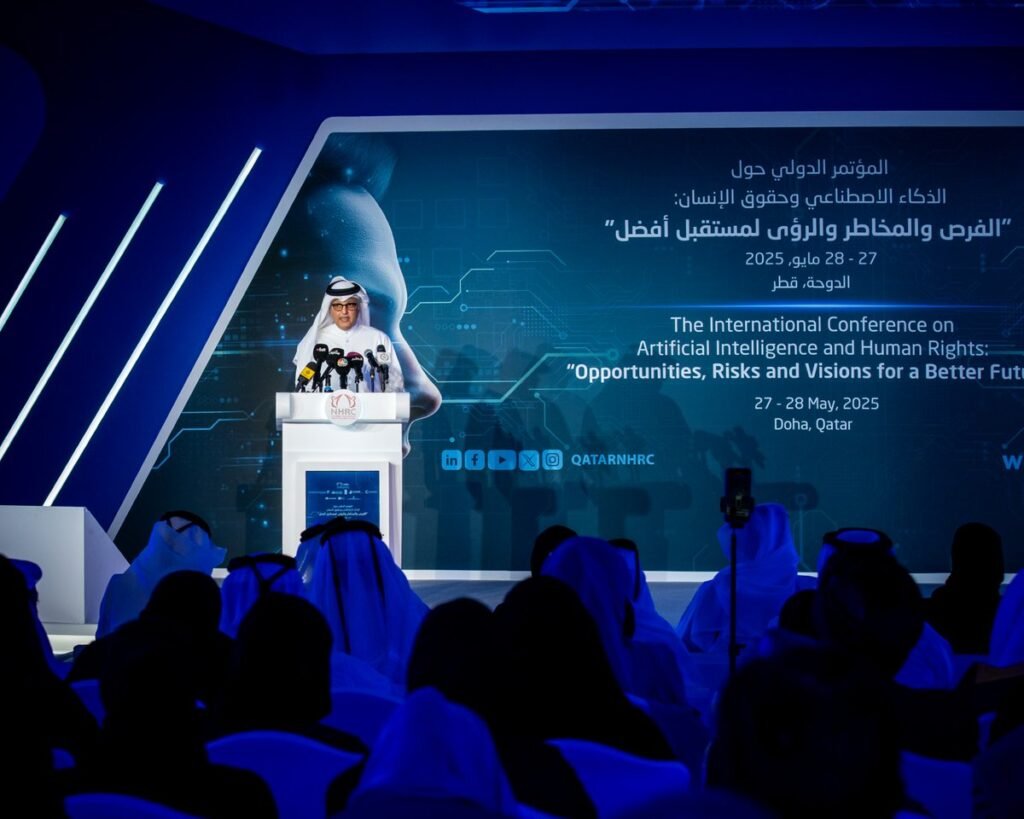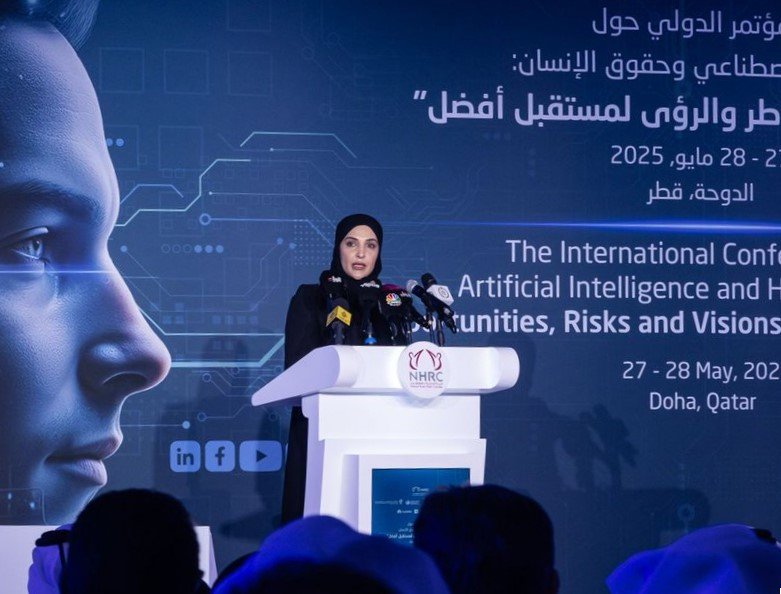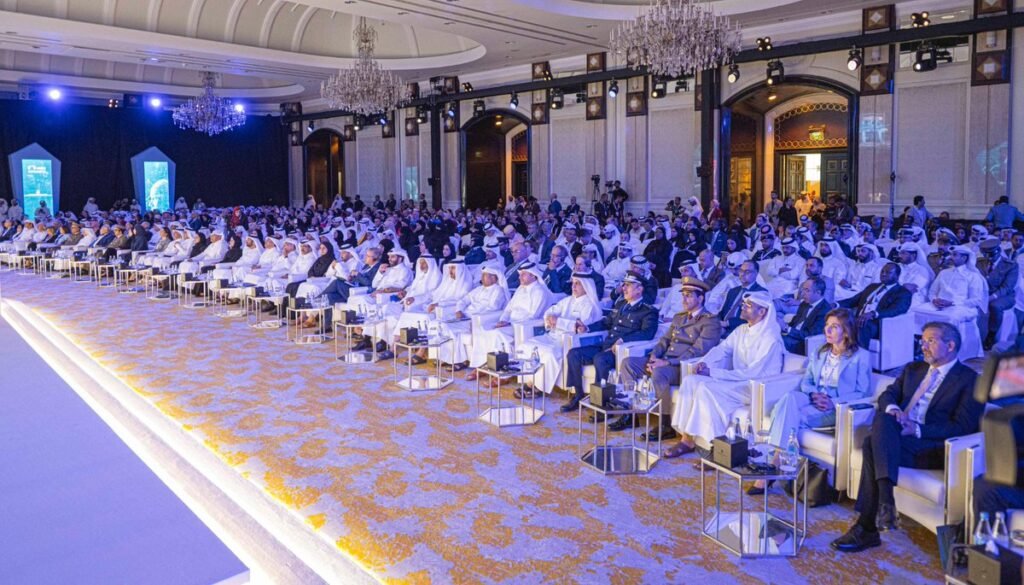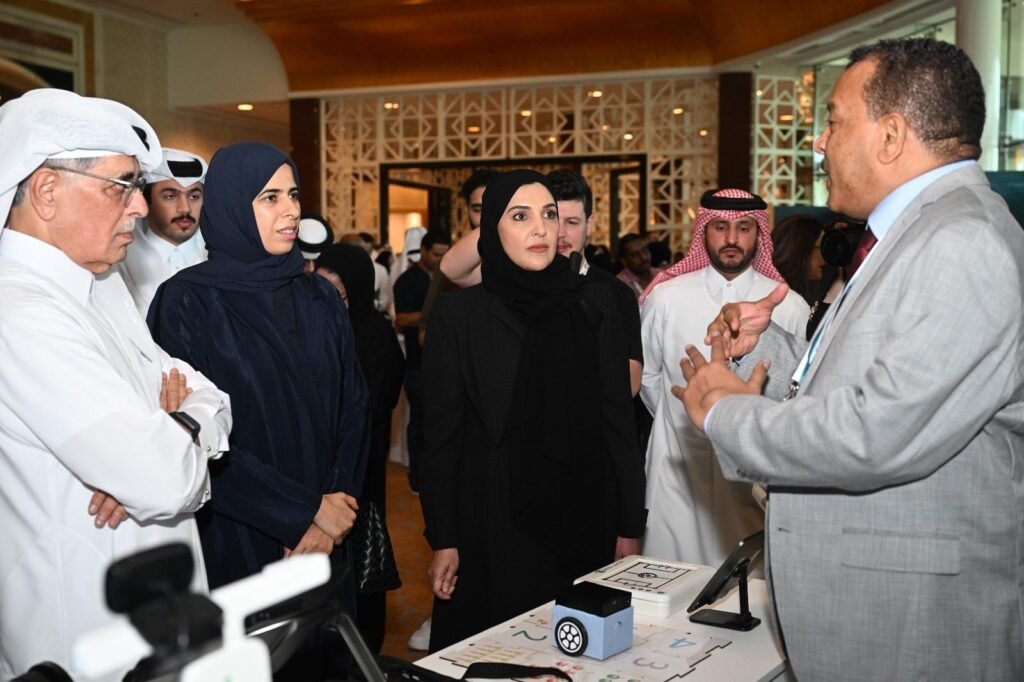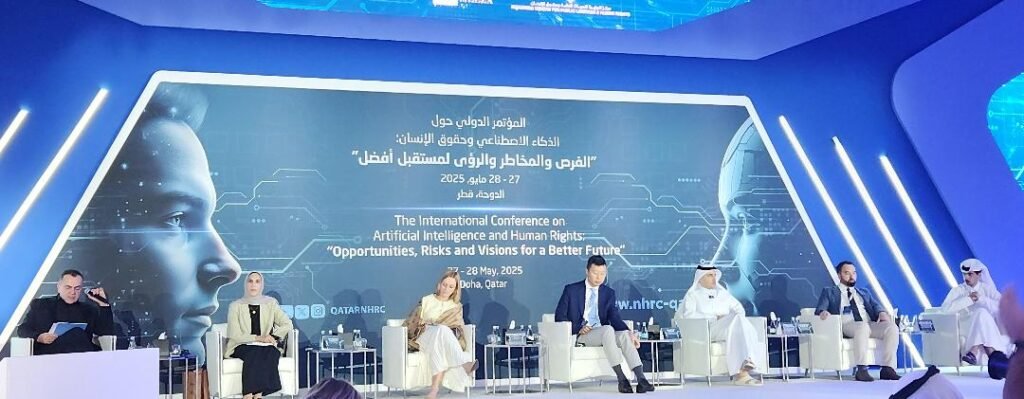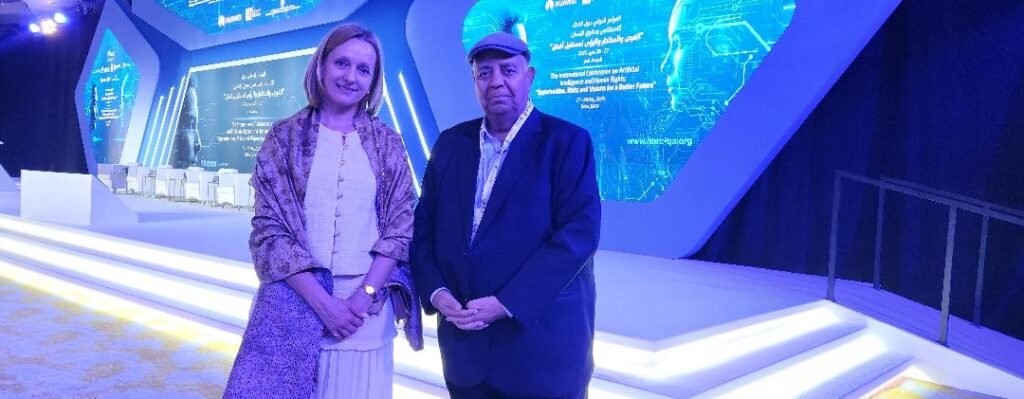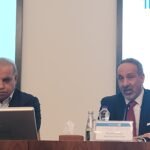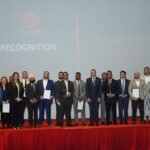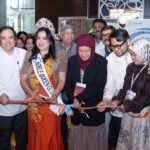Doha, 27 May 2025
International conference titled 'Artificial Intelligence and Human Rights: Opportunities, Risks, and Visions for a Better Future ' began today in Doha. The event is being organized by the National Human Rights Committee (NHRC) in partnership with the Ministry of Communications and Information Technology (MCIT); the National Cybersecurity Agency (NCSA); the UN Development Programme (UNDP); the Office of the High Commissioner for Human Rights (OHCHR); the Global Alliance of National Human Rights Institutions (GANHRI); Huawei; and other major international players in digital technology and governance.
Opening ceremony was attended by Speaker of the Shura Council, Hassan bin Abdullah Al Ghanim; Minister of Social Development and Family, Buthaina bint Ali Al Jabr Al Nuaimi; Minister of Labor, Dr. Ali bin Saeed bin Smaikh Al Marri; Minister of Communications and Information Technology, Mohammed bin Ali bin Mohammed Al Mannai; Minister of Education and Higher Education, Lolwah bint Rashid Al Khater; Minister of State for Interior Affairs, Sheikh Abdulaziz bin Faisal bin Mohammed Al-Thani; Minister of State and President of Qatar National Library, Dr. Hamad bin Abdulaziz Al Kuwari; a number of senior officials; and experts from around the world.
In her keynote speech, Chairperson of the NHRC, Mariam bint Abdullah Al Attiyah, underscored the importance of addressing AI's growing impact on human rights. She highlighted both the immense opportunities AI presents in enhancing healthcare, education, and freedom of expression, and the significant ethical risks, including bias, privacy breaches, job displacement, and threats to human life. Her Excellency stressed that these issues require a human rights-based approach emphasizing transparency, oversight, accountability, and safeguards.
She emphasized that the conference aligns with Qatar’s vision of embedding human rights in emerging technologies and establishing itself as a global tech hub. The event fosters dialogue and collaboration among international institutions, civil society, and AI experts to explore shared solutions and future strategies.
Minister of Communications and Information Technology, Mohammed bin Ali Al Mannai, echoed these concerns, noting that AI is now a transformative force shaping lives and decisions, raising critical questions about fairness, inclusivity, and accountability. He stressed the urgent need for regulatory frameworks to protect human welfare in AI’s evolution. Together, the leaders called for a human-centered approach to AI governance, ensuring human dignity and sustainable development remain at the forefront.
At various panel discussions, the experts underscored the need for ethical governance of artificial intelligence (AI) to protect and promote human rights at every stage of its lifecycle.
At a session titled ' The Power of AI and Human Rights: Risks and Opportunities ', experts highlighted AI’s dual nature: while it can advance justice, combat discrimination, and expose rights violations, it also threatens privacy and deepens discrimination. Chaired by Mohammed Al-Nassour of the OHCHR, speakers such as UN Special Rapporteurs Ashwini K. P. and Reem Alsalem stressed that AI systems often perpetuate systemic biases, creating challenges for marginalized communities and threatening equal access to AI’s benefits.
Panelists argued that the so-called neutrality of technology is a myth. AI reflects the worldviews and biases of its developers and can exacerbate structural discrimination. They called for robust international and national efforts to ensure that AI systems comply with human rights standards, protect privacy, and promote inclusivity.
At a session titled ' Deploying AI for the Benefit of Human Rights ', chaired by Mohamed Oujar, explored how AI can support accessibility, equality, and responsible innovation aligned with the Sustainable Development Goals. Mary Lawlor, UN Special Rapporteur on Human Rights Defenders, emphasized that while AI can significantly improve lives, it also presents challenges for marginalized communities, especially persons with disabilities. She called for unwavering commitment to human rights standards in technological development, noting the urgent need to address algorithmic bias and data privacy concerns.
In his keynote address, Mohamed Ahmed Al-Yamahi, President of the Arab Parliament, echoed these concerns. He underlined that while national legislation is vital for regulating AI use in line with cultural and security priorities, there is an urgent need for a binding international agreement on AI governance. He emphasized that equitable global frameworks are critical to preventing AI from becoming a tool for exclusion or control by dominant players, warning of a new digital divide and the misuse of AI in military applications.
In closing session of the 1st day of the 2-day conference, titled ' The Need for AI Governance: Best Practices for Using AI According to Ethical Standards ', participants stressed that AI must not become a tool for deception or for imposing unjustified restrictions on people’s rights and freedoms. This session, chaired by Zoran Pašalić, Ombudsman of the Republic of Serbia, and moderated by Rukayya Daif of the United Nations Development Programme, featured influential voices such as Laura-Maria Crăciunean-Tatu, Chair of the UN Committee on Economic, Social and Cultural Rights; Vadim Pak of the Council of Europe; and Qatari experts Hassan Jassim Al-Sayed and Abdulrahman Mohammed Al-Shafi.
Crăciunean-Tatu emphasized the central role of UN agencies like UNESCO and the ILO in modern interpretations of rights, highlighting that all human rights—civil, political, economic, social, and cultural—deserve equal respect. She advocated for systematic international human rights treaties as the basis for AI governance frameworks. Al-Shafi noted Qatar’s efforts to protect privacy through dedicated oversight within the National Cyber Security Agency, while Al-Sayed expressed optimism that effective regulatory frameworks can ensure AI’s benefits outweigh its risks.
The session delved into key themes: the readiness of countries to integrate AI responsibly, the formulation of national AI strategies based on ethical values, and fostering inclusive environments that ensure fair access. Participants also explored evolving international, regional, and national regulatory frameworks.
Throughout the conference, participants affirmed that AI’s promise must be matched by rigorous governance frameworks that uphold human dignity and protect fundamental rights. They called for collective action to shape AI’s trajectory in line with shared ethical principles—prioritizing people’s welfare over unchecked technological progress.
On the sidelines of the conference, talking to www.asiantelegraphqatar.com, Prof Dr. Laura-Maria Crăciunean-Tatu, Chair of the UN Committee on Economic, Social and Cultural Rights and professor at Lucian Balaga Unikversity of Sibiu, Romania praised NHRC and UNDP taking the lead in convening this important dialogue on AI and human rights.
'As someone who frequently works in coordination with global human rights institutions under the UN framework, I find such collaboration very natural and essential', she said. An expert from Romania who specializes in the rights of minorities, international humanitarian law, diplomatic law, and international criminal law, said that the theme of the two-day confer ence is indeed crucial.
Replying to a question on the timing of the discussion, she said that it is commend able. “In fact, I believe this kind of discussion should have be gun a year ago. It might have helped us better address some of the issues we’ve seen emerge recently. So yes, the timing is crucial—even if somewhat delayed—and it’s commendable that it’s happening now.”
Praising the organizing skills of such a huge conference, Prof Laura-Maria Crăciunean-Tatu said, “Managing nearly 800 participants from diverse backgrounds is no small feat. The facilities and logistics have been very well handled.”
Talking about her impressions about Qatar, she said this was the first time visiting the country. 'I am deeply grateful for the opportunity to be here. My first impression at the airport was quite striking. It felt like stepping into a futuristic setting. It genuinely felt like the ideal venue for a conference on AI, Prof Dr Tatu said,



